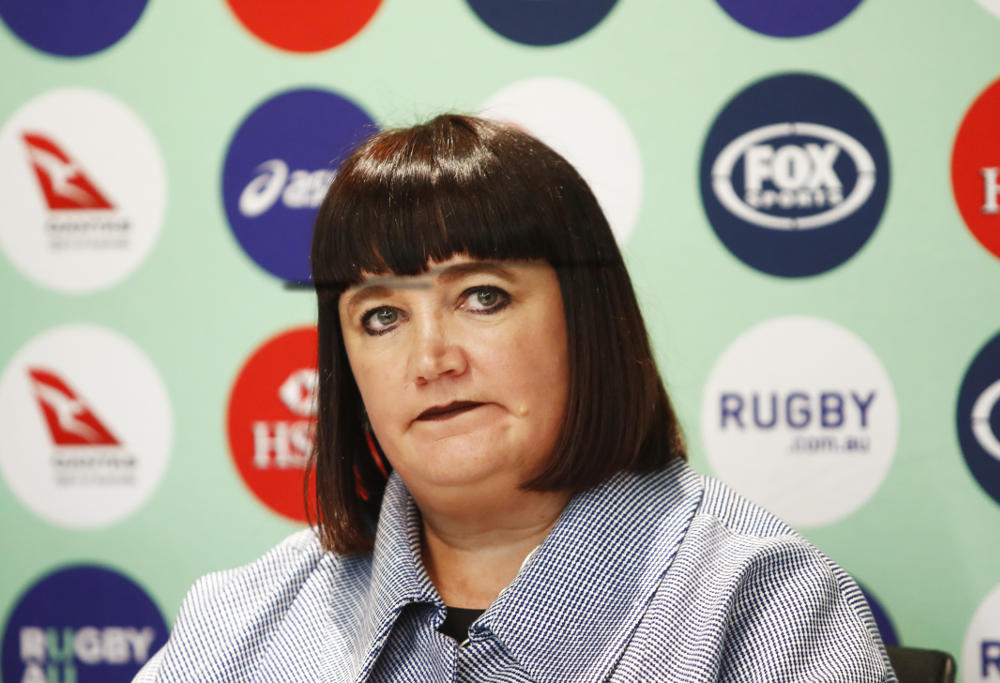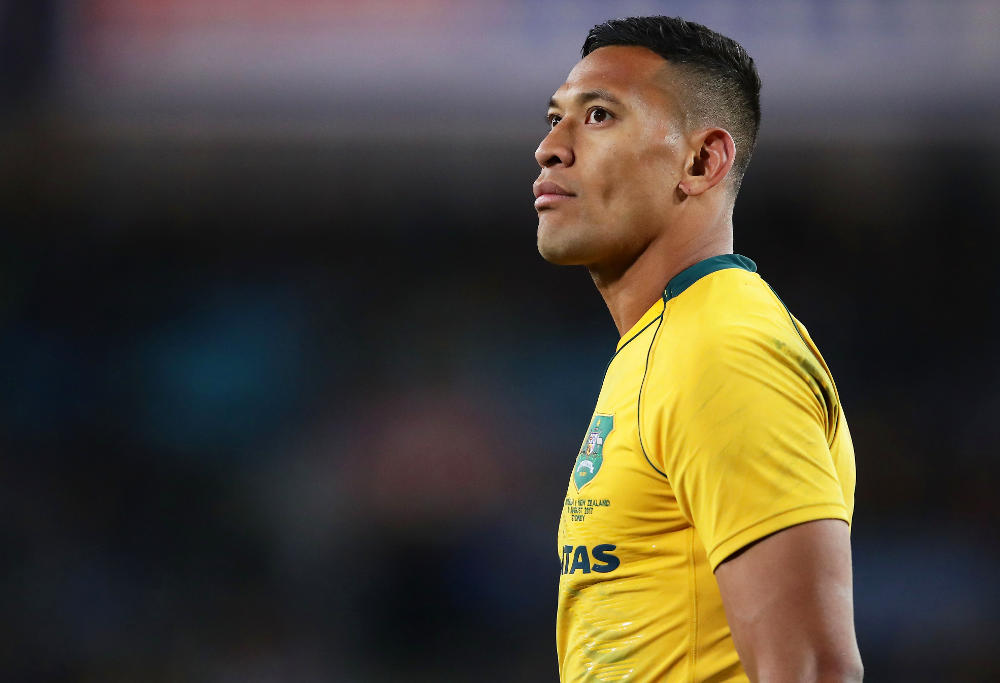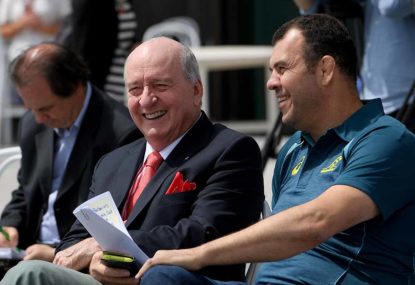Anyone familiar with parrots know that they talk – it’s their ‘USP’ if you like. They also like to repeat the same things over and over, none of which guarantees that what they are saying is worth listening to.
In recent weeks, broadcaster and ex-Wallabies coach Alan Jones has stepped up his attacks on Rugby Australia, via a regular column in The Australian.
Jones has been a long-time critic of the administration, and while he hails originally from country Queensland, it can be said that he aligns with a group of antagonists who believe that rugby should focus on its traditional strengths in Sydney and Brisbane schools and club rugby.
That stance, while overly simplistic, is a valid position, representing the view of a group of genuine rugby people who would like to return to the times when Australian rugby was both more successful and easier to follow. If only it were that easy.
On Friday, Jones narrowed his sights to include new Rugby Australia CEO Raelene Castle, launching an extraordinary attack on her leadership and questioning her suitability for the role.
“It is not believable that the only thing Raelene Castle seems to have done, after months in charge of Rugby Australia, is to haul in Israel Folau for comments that he made about homosexual people and the Bible,” Jones wrote.
“Haven’t Rugby Australia lost BMW, Lion Nathan and Buildcorp as sponsors in recent times? What are you doing about that, Raelene? Does Rugby Australia spend more time checking with its lawyers than it does with checking the wellbeing of the game?”
Jones makes a living delivering rants. Most rants, however, are founded on emotion and preconception rather than logic and reason, and are often used as a vehicle to reinforce existing prejudices or to pursue agendas.
In this case, Jones blames Castle for not doing enough to recover lost sponsors or engage new ones, yet in the same breath berates her for “grandstanding” about Israel Folau, when her management of this issue was clearly aimed at walking the tightrope between keeping Folau in rugby and placating major sponsors Qantas and Land Rover.
Jones is an intelligent man who must know that the problems that beset Australian rugby are deep-rooted, complex and far more nuanced than would allow any new CEO to resolve in the three months Castle has been in the role.

AAP Image/Daniel Munoz
He has travelled the world – London springs to mind – and should know that it is the UK and France, and commercial developments in rugby there since the game became professional in 1995, that are the primary driver of Australia’s misfortunes today.
Maladministration has occurred, particularly with respect to allowing a gulf to develop between the professional and amateur games in Australia.
But rugby is now a global, professional sport. There is no ‘bubble’ that Australia can opt to inhabit, to incubate itself from the negative effects of player (and coach) drain, and its over-reliance on its SANZAAR partners.
Grassroots fans and club members who are told that Australian rugby can withdraw from professional competitions like Super Rugby, or shut down the NRC – its semi-professional national competition – and have the Wallabies remain competitive are being sold a pup.
In recent articles, Jones has named individuals – many of whom who are now working overseas – he believes should be ‘brought home’ and appointed to key coaching and administrative roles. The implication is that Rugby Australia has driven many of these people away, or does not welcome them back.
Jones conveniently chooses to ignore that clubs and national unions in the UK, France and Japan have the wherewithal to offer substantial salaries and an opportunity to see the world. These people are, for the most part, rugby players and coaches making financial and lifestyle decisions, not refugees from some evil, totalitarian rugby administration.
In 1995, the English and French rugby unions – paralysed by the transition into professionalism – sat on their hands and allowed their players to be contracted to clubs, instead of retaining them under their own control. This inaction and its flow-on effects shaped today’s rugby and forced the hand of financially weakened southern hemisphere unions, manifested in decisions such as the exclusion of the Western Force from Super Rugby – not some plan hatched by incompetents who would deliberately and willingly see rugby development in a key growth state set backwards.
Instead of acknowledging these external pressures, in the Parrot world, Castle is consigned to being one of the “no-hopers who are running the game”. She might count herself lucky that, so far at least, Jones has not called for he to be thrown into the ocean in a chaff bag, as he did ex-Prime Minister Julia Gillard.
Who knows, that may yet come, particularly if Australian Super Rugby sides don’t break the run of 34 matches without a win against the Kiwis, or the Wallabies don’t immediately turn around a 15-year Bledisloe Cup losing streak.
Like all stakeholders in Australian rugby, Jones has an opportunity to be part of the solution. Rugby people are a family and people at all levels, administrators at all levels, are approachable and willing to discuss and consider any idea that help. But any such discussions which sit outside of the governance of the game remain nothing more than chatter.
As in Australian politics, where leaders such as Kevin Rudd and Tony Abbott promise to work for the greater good of the team, then proceed to ‘white ant’ regardless, Jones has taken the soft, easy route, of using his platform to denigrate individuals and distort problems, instead of genuinely offering realistic alternatives.
Jones is a destructive influence on Australian rugby, and even if a majority see through his ranting, his profile commands him a platform from which to continue his attacks.

Photo by Matt King/Getty Images
In weekend rugby action, the Hurricanes consolidated their position at the top of the New Zealand conference with a 22-13 win over the Chiefs. While there were the now almost regulation star turns by Ben Lam and Beauden Barrett, it was the consistency of performance across the team that impressed most.
From living in the shadow of Dane Coles, and with another shadow looming in the form of Asafo Aumua, Ricky Riccitelli continues to impress with his high workrate and eagerness to play on the front foot. Jordie Barrett, too, refuses to hide in the formidable shadow of his brother, cool and accomplished with the ball and deadly on the tackle.
The Chiefs, as is their wont too often, were typically creative but let themselves down with handling errors, mistimed passes and – in the first half – a non-pass by Nathan Harris which almost certainly cost them a try.
The Blues righted some of last year’s Tokyo wrongs with a 24-10 win, Reiko Ioane’s silky catch and pass for their final try a sign that he will be well suited to the All Blacks’ 13 jersey whenever he and Steve Hansen decide it is time.
The Rebels left AAMI Park frustrated with a home loss, 25-22 to the Jaguares, once again losing their way in the second half, this time over-playing the influence of some rain and playing too narrowly. There was also a noticeable drop-off in intensity and spark, which coincided with Will Genia leaving the field with a leg injury. Other senior players must accept responsibility for providing this, if they are to continue to push for a finals spot.
After a disrupted travel schedule – a day lost in transit and the final kilometre to the stadium undertaken by foot after the team bus became snarled in heavy traffic – the Jaguares showed impressive resolve, growing into the game and finishing strongly.
Their defence in the final stanza was outstanding, as indeed was their discipline – encouraging signs from a side with a previously demonstrated weakness in mental fortitude.
[latest_videos_strip category=”rugby” name=”Rugby”]
The Brumbies paid the price for too much side-to-side attack and an over-reliance on David Pocock. If the 43-17 scoreline perhaps overstated the difference between the two sides, full credit is due to the Highlanders for playing on after the final siren, despite already having secured a bonus point, and scoring a final try to Fletcher Smith. That’s how you provide value for fans and get them to come back next time!
The Reds looked fantastic in their ‘old school’ uniform of maroon shirts and blue shorts, but that was as good as it got for them, as the Waratahs were much faster and more cohesive, stretching out to a deserved 37-16 win. NSW are building momentum, have figured out how to utilise Taqele Naiyarovoro, and now that they have found the top of the Australian conference, they will be hard to toss.
Sharpshooter Rob du Preez missing an easy penalty from in front signaled trouble for the Sharks, thrashed 40-10 at home by the Bulls and, in the process, undoing all of the promise shown on their New Zealand trip. The Bulls now rise to second in the South African conference, with a game in hand over all their opponents, but we can expect that these sides will continue to take points off each other when least expected, and a finals spot is still wide open.
It seems strange to acknowledge any New Zealand rugby win as an ‘upset’, but congratulations to both the New Zealand women’s and men’s sevens sides for claiming unexpected Commonwealth Games gold medals over the respective Olympic champions, Australia and Fiji.
The women’s final, in particular, was a thrilling affair, once again a great advertisement for rugby on a wider stage.
Now that’s the sort of rugby story that’s well worth parroting, Mr Jones!































































































